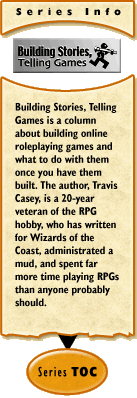
|
Exploring Genres — There's Something Funny Going on Hereby Travis S. Casey Last time, I talked about comedy in multiuser online games, and a few reasons why it's harder than it looks. This time, I'd like to talk about what goes into making a comedy setup. How to Be FunnyThere's a lot of different types of comedy, but we can boil all comedy down to three basic things:
Characters who are exaggerated like this can help in another way — by making it harder for players to identify with the characters. This might seem like an odd way to "help", since in roleplaying games, we normally want players to identify with their characters. However, as I pointed out last time, one of the problems with doing comedy in an online game is that it's hard for most people to laugh at themselves. By decreasing character identification, you make it easier for the players to be both character and audience at the same time. Settings and situations can also be exaggerated, especially in parody. Situations are regularly exaggerated, even in non-parody comedy — note how characters in sitcoms regularly act as if something that should be a minor embarrassment is a major problem. Setting isn't exaggerated as often, but it can be done with good effect. The best example of an exaggerated setting I can think of is that in Diana Wynne Jones' The Tough Guide to Fantasyland and Dark Lord of Derkholm — which would work very well for online games parodying online games. However, while exaggeration can be a good tool, be careful not to overdo it — the joke can get old quickly. Crossing normal boundaries is actually a broad category — if you wanted to, you could stretch it to cover the other two "basics" that I've listed. I think it's good to break things down a bit more than that, though — otherwise, one tends to handwave things too much, I think. One example of crossing normal boundaries is the removal of inhibitions. Characters who do and say things that we'd like to in their situation, but wouldn't because of social or other constraints, can be funny — and audiences tend to like them. Scott Adams uses this technique often in Dilbert — for example, with Wally, who feels little need to hide the fact that he does as little work as possible. Not to mention Alice and the "must control fist of death" running gag. Also in this subcategory are plenty of "working class hero" films, like Take This Job and Shove It. Ethnic jokes, mentioned above as exaggeration, are also an example of crossing normal boundaries — they say out loud what some people think. The danger with this technique is found in ethnic jokes as well, though: the chance of offending people. To some extent, that's a risk one has to take, since almost anything is bound to offend someone, but it's still wise to exercise a degree of care. (Note, though, that the danger can be greatly lessened in an online game by crossing boundaries with respect to made-up groups. Orc jokes aren't likely to get hordes of anti-orc-defamation protestors after you.) The online newspaper parody The Onion often crosses normal boundaries for its humor. One way that it does this is simply to make up outrageous stories, like the current "Pope Forgives Molested Children" story. (Which again points out the possible danger of offending people... there's almost surely some people out there offended that The Onion would even think of joking about such a topic, much less that they'd do it the way they did.) The Onion also gives a good example of reversing expectations — reporting "news stories" that are so commonplace that they'd never be considered "news" by anyone in reality. (For example, the story "Factual Error Found on Internet". Many classic jokes are also founded in reversing expectations — from Henny Youngman's "Take my wife — please!" to "I was surprised as a kid when my teeth came out. I didn't know my dad could hit that hard," there's an entire subgenre of jokes based on building an expectation on the part of your audience and then reversing it. A lesser degree of the same principle is shown in puns and double entendres — not necessarily completely reversing expectations, but using a word or phrase that can be interpreted in different ways. While jokes themselves are a thin basis to build ongoing interactive humor on, the same sort of double meanings can be used as a basis to build on, by having characters misinterpret something they hear or see — a common device in sitcoms. Notes and WarningsI can't teach a whole course in comedy in one column, obviously (for one thing, I'm not being paid enough to!), but the few principles above are enough to make a start. I've got a few random thoughts left to throw out about doing comedy in online games, though:
... and that's it for comedy, I think. Join me next time as I... well, I'm not sure what I'm hitting next yet. But join me, OK?
|
